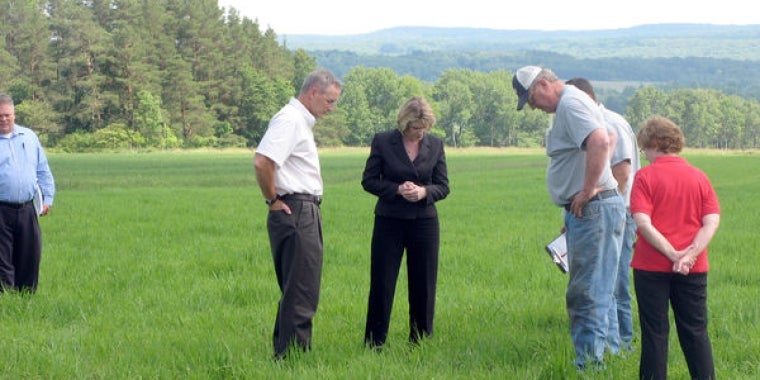State Sen. Cathy Young (R-Olean) and County Executive Greg Edwards gathered alongside Bruce Kidder on his farm in Jamestown Friday to discuss what action needs to be taken against the armyworm.
The armyworm is a species which is native to the southern parts of the United States. Occasionally, during the growing season, the armyworm will make its way into the northern states, however it does not overwinter here.
Due to the unseasonably warm weather experienced towards the earlier months in 2012, as well as other meteorological phenomena which conspired in their favor, the armyworm has made an early and conspicuous journey to the north and is wreaking havoc on crops across Chautauqua County and the entire Western New York area.
Though given the nomenclature "worm", the armyworm is actually a caterpillar which will metamorphose into a moth. Currently, most armyworms in Chautauqua County are either currently pupating and therefore have already burrowed themselves into the ground or will begin pupating in the coming days.
Once the armyworms metamorphose, they could potentially catch a storm front and travel further north. However, since Chautauqua County has never seen a pestilence of armyworms of this magnitude, some worry that, due to sheer numbers, at least some moths could stay in the area and produce a second generation of the destructive worms.
"I've talked to people who have worked for or in cooperation with (Cornell Cooperative Extention) for 50 years and they tell me they've never seen anything like this before," said Dan Steward, crop consultant for the WNY Crop Management Association, "In my 20 years of doing this, this is by far the most widespread just the worst I've ever seen it."
The armyworm likes to feed upon grasses and forage crops such as alfalfa and timothy and will only feed upon crops such as corn in times of starvation. However, dairy farmers rely upon an abundant crop of grasses to feed their cattle over the winter and because of the immense damage the armyworm has caused, some dairy farmers are looking at a dire situation come winter.
According to Steward, many farmers cut their grasses and forage crops three times a year. He said he knew some farmers that are facing a 100 percent loss of first cut grasses.
For those farmers who have yet to make their first cut, he had one piece of advice.
"Cut now," said Steward. "There's no reason to wait to allow these worms to do any more damage. Make your cuts now and start preparing to protect your second cut."
With regards to protecting the second cut of grasses, farmers have a few options. Like other moths, the adult form of the armyworm is attracted to lights at night. By keeping outdoor lights off at night, it may help deter armyworm moths from settling on surrounding grasses. With regards to prevention, there are several insecticides which have proven effective in protecting grass. Treatments such as acelepryn, lambda-cyhalothrin and deltamethrin have shown to work well in killing the armyworm according to Cornell Turfgrass.
For farmers who have already lost an entire cut and feel as though their backs are against the wall, Sen. Cathy Young had news which should help.
"We have pushed very hard and have convinced (Gov. Cuomo) to ask the federal government for a disaster declaration related to the weather," said Sen. Young. "That declaration is in place and now the USDA has ruled that they will allow armyworm damage to be included as weather related crop damage because the armyworms are here earlier and their population has exploded due to the unseasonable weather. When that gets put together, we have the declaration in place, but now for armyworms to truly qualify, we need a threshold of damage. Farmers that have incurred any sort of damage are strongly, strongly encouraged to report it, because that could get us to the threshold where we would get some assistance from the government."
According to Edwards, it's a situation where farmers can really help each other out. Once a damage threshold is reached, the government will make low-interest, short-term loans available to help farmers compensate for the damages caused by the armyworms. However, farmers who have not incurred enough damage to merit taking out a government loan are still encouraged to report the damage done to their crops by armyworms to help the county collectively reach the damage threshold.
All armyworms damage reports should be reported to the county's Farm Service Agency office. The telephone number for Chautauqua County's office is 664-2351.



